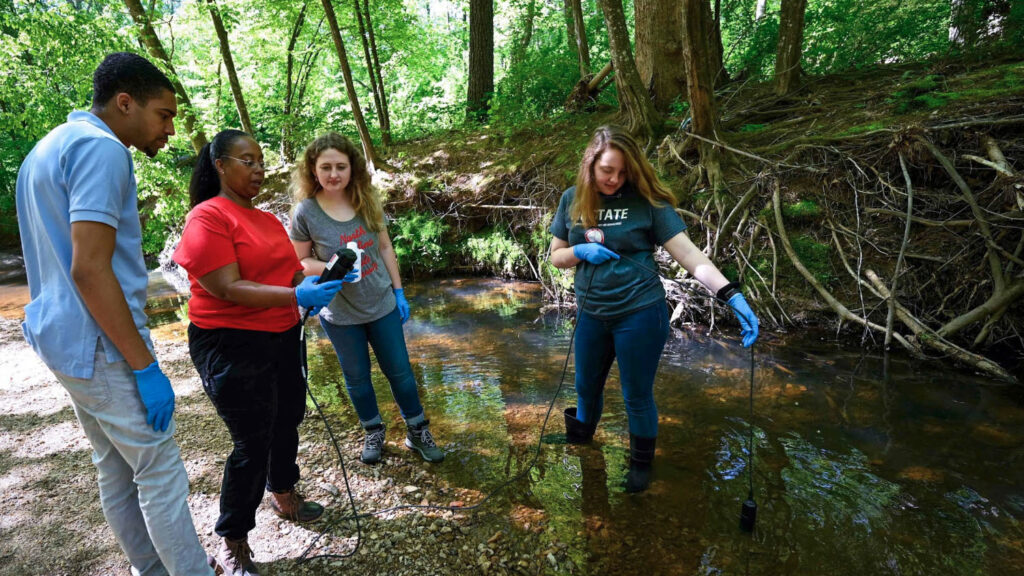Environmental Technology and Management

What is Environmental Technology and Management?
Environmental Technology and Management prepares students to be on the frontline of protecting our environment. This STEM major (Science, Technology, Engineering and Mathematics) combines the study of chemistry, ecology, pollution prevention, technology and management systems. Students graduate prepared to solve environmental and sustainability problems, are versed in environmental regulations, and gain the skills to work closely with engineers and engineering firms.
By working in both the field and the lab, students learn to measure toxins and pollutants that exist in our air, water, plants and soils using comprehensive environmental equipment and technological tools. Through service learning and partnerships with entities such as the City of Raleigh Wetlands Center, students regularly monitor and assess real environmental issues and recommend solutions.
Faculty and students also conduct research based on real-world challenges, like how trees can be used to remediate contaminated soil and groundwater.
Students also gain hands-on experience with industry, government and non-profit organizations in our required Environmental Technology and Management internship class. The Environmental Protection Agency, RTI International and many state regulatory agencies are located within 20 minutes of NC State’s campus, which makes getting internships for class even easier.
Environmental Technology and Management Curriculum
- Semester by Semester Plan
- Popular minors include Environmental Toxicology, Renewable Energy Assessment, Soil Science and Wetland Assessment.
Students graduate with up to two professional certifications
Hazardous Waste Operations and Emergency Response (HAZWOPER) and OSHA General Industry Training Card Certification
Learn More About Environmental Technology and Management
Forestry and Environmental Resources Student Success
What can you do with an Environmental Technology and Management degree?
Our Environmental Technology and Management majors graduate with options. In fact, the Bureau of Labor Statistics expects environmental scientist and specialist positions to increase at a rate of 11 percent during the next 5 years, a rate higher than the national average. From pursuing careers with private industry or the government, to continuing their research at the graduate and Ph.D. level, our graduates are equipped to fulfill their passions.
Sample Environmental Technology and Management Careers
- Environmental Scientist or Field Scientist– Assess the environmental health and stability of a specific area. Determine the levels of pollution and environmental issues in the water, air and soil of an ecosystem. Clean up and remediate pollutants in contaminated areas. Recent employers include environmental engineering and environmental consulting firms like AECOM, Terracon, RTI International, USGS, TRC and One Environmental Group.
- Environmental Specialist or Technician – Observe the impact of specific populations on the environment, identifying key problem areas and recommending solutions. Prepare and test field samples of gases, soils, water and wastewater to determine pollutant levels of contamination. Ensure that all air, water and soil regulations are met. Work with research groups to collect data monitoring toxins that can negatively impact human and ecological health. Recent employers include Solutions IES, Wake County Department of Health, and NC State Center for Applied Aquatic Ecology.
- Sustainability Coordinator – Develop and implement plans to make sustainability efforts part of everyday business practices. Recent employers include municipalities like City of Raleigh, universities like UNC, and companies like SAS.
- Air Quality Technician or Specialist – Monitor pollution levels of factories, government agencies and environmental organizations. Assess and maintain emissions and enforce compliance laws. Recent employers include the NC Division of Air Resources and the SC Department of Health and Environmental Control.
- Environmental Health and Safety Officer – Inspect and evaluate equipment and processes to ensure safety compliance and regulations are met. Identify potential hazardous biological, chemical and radiological materials for further analysis. Provide safety training. Recent employers include Duke Energy, Caterpillar, Avoca and NC Department of Labor.
- Environmental Consultant – Perform environmental site assessments and provide solutions to ensure that clients meet all compliance and environmental regulations. Recent employers include the OTIE, a contractor to the EPA and One Environmental Group.
- Water Quality Technician or Specialist – Sample, measure and monitor water, including surface, recreational, drinking and wastewater, for microbes and chemical pollutants to ensure EPA and state standards are met. Recent employers include the cities of Raleigh and Durham, Cape Fear Utilities and Orange County Water and Sewer (OWASA).
- Solar Projects Developer or Technician – Size, install and maintain solar power systems on commercial and residential buildings. Assess land for large solar photovoltaic projects. Work with both passive systems, such as heat from a window, and active systems, such as solar panels on a roof that gather and direct sunlight into electrical systems. Recent employers include Solar Now, Renew Energy Solutions and Alpha Energy.
- Renewable Energy Specialist or Quality Manager – Review and strategically evaluate renewable energy sources and quality. Redesign processes and systems to increase energy efficiency. Recent employers include U.S. Ecologics Tex Energy, Holocene Clean Energy, and Doman Engineering.
- Energy Efficiency Engineer – Provide technical expertise and support in energy conservation initiatives with energy distribution systems for residential, commercial and industrial clients.
- Peace Corp Volunteer – Travel abroad to support environmental initiatives and improvement projects.
Environmental Technology and Management Careers
Forestry & Environmental Resources Job Board
Next Steps

Schedule a visit to the College of Natural Resources

Learn about our scholarships
